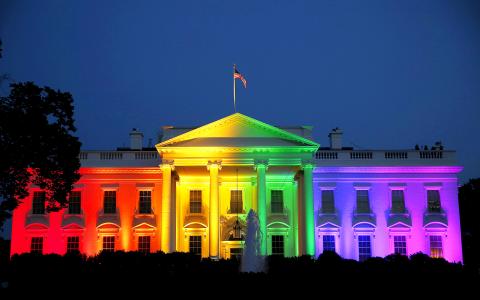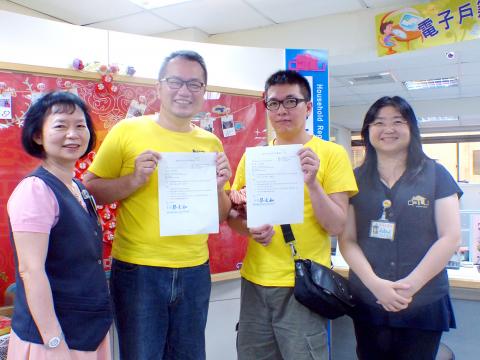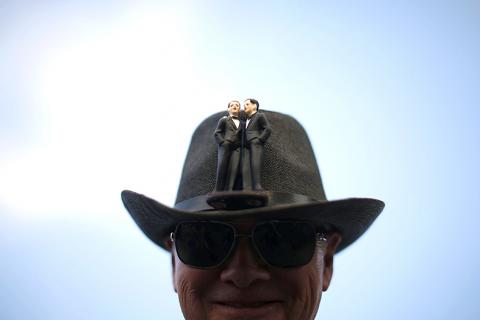In an effort to promote equal rights, the Kaohsiung City Government launched its “sunshine registration” (陽光註記) policy last month, a scheme that allows unofficial registration of same-sex couples at its household registration offices. Although the measure is not legally binding, it set a good example for other cities and counties.
Encouraged by Kaohsiung, the Taipei City Government adopted a similar measure starting June 17, while taking a step further by negotiating with the Ministry of Health and Welfare to allow registered couples to make medical decisions for their partners. It also announced the inclusion of same-sex couples in the city’s public mass weddings starting this summer.
Both Kaohsiung and Taipei deserve applause. After fighting for the rights of lesbians, gays, bisexuals and transgenders (LGBT) since the mid-1980s, Taiwan’s gay rights movement has finally made a substantial breakthrough this year.

Photo: Reuters
EQUAL IN THE EYES OF THE LAW
Meanwhile, the LGBT community in the US is celebrating a historic ruling the Supreme Court issued on Friday guaranteeing a constitutional right to same-sex marriage.
“This ruling is a victory for America,” said US President Barack Obama in response to the 5-4 ruling, while Justice Anthony Kennedy wrote for the majority that “[n]o union is more profound than marriage, for it embodies the highest ideals of love, fidelity, devotion, sacrifice and family.”

Photo: Hsiao Ting-fang, Taipei Times
“It feels so good to be treated equal,” Jonathan Hao, a Taiwanese-American gay man who resides in San Francisco, told Taipei Watcher. Hao plans to celebrate the big moment with some Taiwanese friends at the pride parade of the world’s gay capital this weekend.
A TOUGH JOURNEY
It has been a tough journey for the US gay rights movement since it began calling for equal rights. After decades of suppression, a series of street demonstrations broke out against police raids that took place in 1969 at Stonewall Inn, a famous gay bar in New York. This key event served as a catalyst to a more active gay rights movement.

Photo: Reuters
In recent decades, the movement has come a long way. A national debate on same-sex marriage began in 1996 because of a legal challenge to Hawaii’s ban on such unions. A 2003 court ruling made Massachusetts the first state to grant marriage rights to same-sex couples. After the US Supreme Court made two landmark rulings to support gay rights in 2013, acceptance of marriage equality reached a new high of 61 percent in a recent poll.
TAIWAN LAGS BEHIND
As we applaud the US ruling, it is worthwhile to look back at the evolution of Taiwan’s gay rights movement. During the Martial Law era, most Taiwanese refused to broach what was at the time considered a sensitive topic. This began to change with the publication of Kenneth Pai’s (白先勇) Crystal Boys (孽子, literally: “sons of sin”). The novel is about Taipei’s gay community, and was serialized in 1977 and published in 1983. It is written by a gay man and is widely recognized as a classic of Chinese-language gay literature.
Since the 1990s, more LGBTs have started to come out. In 1993, National Taiwan University (NTU) established the NTU GayChat (台大男同性戀社), the nation’s first gay student club. Three years later, Taiwanese writer Hsu Yu-sheng (許佑生) and his American partner Gary Harriman held the first public same-sex wedding, while some politicians made campaign promises sympathetic to the LGBT community to attract votes.
The then Taipei mayor Chen Shui-bian (陳水扁) repeatedly pledged to protect gay rights, but he canceled the Rainbow Lovers’ Week (彩虹情人週) for the LGBTs in 1997. An incident on Taipei’s Changde Street (常德街) later caused much controversy, as the police made a raid in a public space known for “gay cruising,” and on July 31, 1997 40 to 50 LGBTs were arrested under questionable circumstances. The arrests were followed by a series of protests, leading many to dub it “the Stonewall Incident of Taiwan.”
Over the past decade, events such as the Taiwan LGBT Pride Parade (台灣同志遊行) have successfully raised awareness of LGBT rights. The street party attracts tens of thousands of people from across the globe.
In recent years, the LGBT community has pushed for marriage equality through legislation. Opinion polls show that more than half of the public supports it, but the legislation has been blocked repeatedly by certain politicians and religious leaders.
TIME TO ACT
Despite some noise, Taiwan’s support for marriage equality continues to grow, while cities and counties are taking actions to show support. The latest development is somewhat similar to the US. Since the superpower has always been highly influential, the ruling is expected to influence our concept of marriage equality.
“I hope that Taiwan can also legalize same-sex marriage, so our next generation can all grow up in a world full of love and acceptance,” Hao said.
Regrettably, Deputy Minister of Justice Chen Ming-tang (陳明堂) said yesterday that his ministry would not consider allowing same-sex marriage now, because the situation in Taiwan is different from the US, not to mention that the issue is controversial in society. His irresponsible remarks are biased and unacceptable.
Gay rights are human rights, and the protection of equal rights is a universal value. As Taiwan tries to catch up with other developed countries, this columnist would like to urge the central government and Judicial Yuan to take the initiative to protect gay rights, not delaying them. After all, this global trend is already unstoppable, and legalization of same-sex marriage is just a matter of time.

On April 26, The Lancet published a letter from two doctors at Taichung-based China Medical University Hospital (CMUH) warning that “Taiwan’s Health Care System is on the Brink of Collapse.” The authors said that “Years of policy inaction and mismanagement of resources have led to the National Health Insurance system operating under unsustainable conditions.” The pushback was immediate. Errors in the paper were quickly identified and publicized, to discredit the authors (the hospital apologized). CNA reported that CMUH said the letter described Taiwan in 2021 as having 62 nurses per 10,000 people, when the correct number was 78 nurses per 10,000

As we live longer, our risk of cognitive impairment is increasing. How can we delay the onset of symptoms? Do we have to give up every indulgence or can small changes make a difference? We asked neurologists for tips on how to keep our brains healthy for life. TAKE CARE OF YOUR HEALTH “All of the sensible things that apply to bodily health apply to brain health,” says Suzanne O’Sullivan, a consultant in neurology at the National Hospital for Neurology and Neurosurgery in London, and the author of The Age of Diagnosis. “When you’re 20, you can get away with absolute

May 5 to May 11 What started out as friction between Taiwanese students at Taichung First High School and a Japanese head cook escalated dramatically over the first two weeks of May 1927. It began on April 30 when the cook’s wife knew that lotus starch used in that night’s dinner had rat feces in it, but failed to inform staff until the meal was already prepared. The students believed that her silence was intentional, and filed a complaint. The school’s Japanese administrators sided with the cook’s family, dismissing the students as troublemakers and clamping down on their freedoms — with

As Donald Trump’s executive order in March led to the shuttering of Voice of America (VOA) — the global broadcaster whose roots date back to the fight against Nazi propaganda — he quickly attracted support from figures not used to aligning themselves with any US administration. Trump had ordered the US Agency for Global Media, the federal agency that funds VOA and other groups promoting independent journalism overseas, to be “eliminated to the maximum extent consistent with applicable law.” The decision suddenly halted programming in 49 languages to more than 425 million people. In Moscow, Margarita Simonyan, the hardline editor-in-chief of the